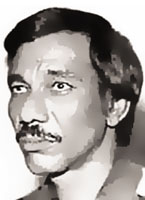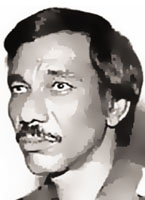
Faces & RracesAmal Dunqul, poet of the marginalized, oppressed and poor [Archives:2008/1132/Culture]
February 25 2008
 |
Mohammed Amal Faheem Dunqul, known as Amal Dunqul, was an Egyptian poet and intellectual. He was born in 1940 in Al-Qala'a village, Qift district, located in Egypt's Qina governorate.
Dunqul's father named his first male child Amal, which means hope in Arabic, in the same year he received his teaching licensure from Egypt's Al-Azhar University. Also a writer of classical poetry, he possessed a library filled with books – of which his son took advantage – in the various Islamic disciplines. He died when Dunqul was 10 years old and at such a young age, the son became responsible for his mother and two younger brothers.
Completing his primary education in 1952, Dunqul continued his studies at Qina High School in the mid-1950s, graduating in 1957. He moved to Cairo in 1958 to work for Al-Sa'aed Autobus Company, at the same time enrolling in Cairo University's Faculty of Arts. However, he dropped out before the end of his first year, quit his job and returned to Qina to work for his living.
Dunqul found work at the Qina Justice Court in 1959, followed by working at the Suez and Alexandria branches of the Customs Authority, as well as the Afro-Asian Solidarity Organization.
He returned to Cairo and settled in the early 1960s. Abla Al-Ruwayni, a journalist for Egypt's Al-Akhbar (The News) newspaper, interviewed him in October 1975, subsequently becoming his wife two years later.
Dunqul began writing poetry in high school, with some of his poetry published at Qina High School in 1956. He continued his classical style of poetry until 1962 when he turned to free verse.
He was known for his politically colored poetry, however throughout the 1950s, Western mythology, especially Greek mythology, dominated his writings. He later relied more on pre-Islamic and Islamic imagery to modernize and revolutionize Arabic poetry.
In the literary scene at that time, Dunqul was dubbed “the prince of political rejection poets,” “the pauper's poet” and “the cafe poet.” He suffered poverty and marginalization due to his patriotic and nationally defiant attitudes.
The left-wing poet who wrote in classical Arabic was renowned for his poetry, which represented a milestone in modern Arabic poetry. Additionally, his poetic works fought against those voices calling for normalized relations with Israel.
Dunqul's first poems were published in 1961 in Egypt's Al-Ahram (The Pyramids) newspaper. Throughout his 22 years of writing poetry, Dunqul issued eight poetic divans, the first of which was 1969's “Al-Buka'a bayn Yadi Zarqa'a Al-Yamama” (“Crying in the Presence of Zarqa'a Al-Yamama”), in which the poet embodied Arab feelings regarding the aftermath of the Six-Day War of 1967 between Israel and Egypt, Jordan and Syria.
His second divan, 1971's “A Commentary on What has Happened,” depicted Dunqul's strong rejection of all types of political corruption, dualism and disagreements within Arab societies.
Following the partial Arab victory in the 1973 Arab-Israeli War, Dunqul wrote no poem glorifying this victory. Instead, he issued his third divan, 1974's “Death of the Moon,” which likewise contained no poem regarding that war.
His other poetic works include the 1975 divan, “The Forthcoming Epoch.” Published posthumously, 1983's “New Statements About Al-Basoos War” contained Dunqul's rejection of the prospective reconciliation between Egypt and Israel in the late 1970s.
Dunqul's wife collected and posthumously published his final divan, “Papers of Room No. 8,” in 1983. Containing Dunqul's last poems penned during his three-year stay in room number 8 at the National Tumor Center, the collection included poems tackling humane and sensitive meanings in life, such as flowers, birds and horses.
Nearly 20 years after his death, the Egyptian government honored Dunqul in May 2003 by organizing a four-day seminar in Cairo entitled, “Amal Dunqul, the Achievement and the Value.”
That same year, the National Center for Children's Education, in cooperation with Egypt's Supreme Council for Culture, issued the book, “For Boys and Girls,” containing selected poems by Dunqul. Additionally, his June 1967 poem, “Crying in the Presence of Zarqa'a Al-Yamama,” was included in Kuwait's high school curricula.
Among Dunqul's most political and influential poems are 1962's “Last Words of Spartacus,” 1970's “No Time for Crying” and 1976's “Kulaib's Death: Ten Commandments,” also known as “No Reconciliation.”
The poem, “The Song of the Stony Cake,” was penned in 1972 after several Cairo University students were arrested for striking, calling for the Egyptian government's resignation and demanding a more robust foreign policy.
Published posthumously in 1985, “Amal Dunqul, the Complete Works,” contained the poet's six divans, in addition to other poems published for the first time. Dunqul's widow collected and published several books about her late husband, including 1985's “Amal Dunqul: The Southerner” and 2003's “Amal Dunqul's Bibliography.”
Dunqul began suffering from lung cancer in 1979. Following a more than three-year battle, he died May 21, 1983 in Cairo at age 43. Although Dunqul physically has vanished forever, he remains present in contemporary Arabic literary life through his exquisite and national poetic works.
——
[archive-e:1132-v:15-y:2008-d:2008-02-25-p:culture]


